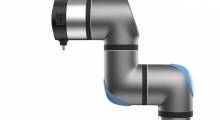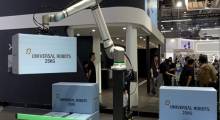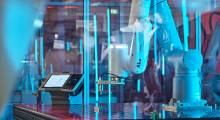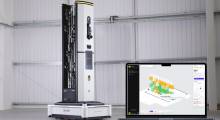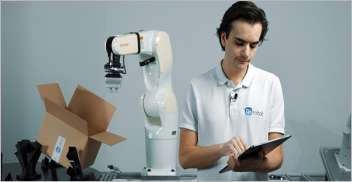A consortium of universities, technology accelerators, and private research labs, funded by the European Union’s Horizon Europe 2021-2027 research and innovation program recently announced the launch of RoboSAPIENS. The project aims to ensure industrial robots of the future can readily adapt to changing environments, while maintaining safe and trustworthy collaboration with humans.
According to data from the International Federation of Robotics (IFR) 2022 World Robotics Report, industrial robot installations in Europe were up 24% to 84,302 units in 2021.
Adaptive robotics, or robots that can learn new tasks through AI without needing to be reprogrammed, are on the cutting edge of this growth, The RoboSAPIENS consortium said. While adaptive robots play an integral role in advancing the efficiency of collaborative robotics environments in industries like manufacturing, healthcare, and logistics, challenges remain in ensuring the safety and trustworthiness of such technology.
Trustworthiness checkers for deep learning AI
RoboSAPIENS said it aims to advance the field of robotic self-adaptation and empower robots with open-ended autonomous software adaptations, allowing them to dynamically respond to unforeseen changes in system structure or environment while maintaining trustworthy collaboration with humans.
Specific objectives for the program include:
- Enable open-ended adaptation: develop control software for robotic open-ended self-adaptation, specifically addressing unprecedented changes in system structure and environmental conditions, including human-machine interactions.
- Enhance safety assurance: advance safety engineering techniques to ensure not only pre-adaptation but also during and post-adaptation safety, incorporating trustworthiness checkers and self-evaluation schemes.
- Reduce task uncertainty with deep learning: utilize deep learning techniques to actively reduce task uncertainty in robotic self-adaptation, ensuring more reliable and reproducible adaptations, with a focus on addressing uncertainties inherent in deep learning models.
- Assure trustworthiness: develop and apply formal methods to assure the trustworthiness of systems using both deep learning and computational architectures for robotic self-adaptation, incorporating verification tools and techniques.
“As the EU advances its industrial robotics capabilities, it’s imperative that measures be taken to ensure the safety and trustworthiness of the next generation of robots working alongside humans in a collaborative environment,” said Peter Gorm Larsen, RoboSAPIENS project coordinator and a professor in the department of electrical and computer engineering at Denmark’s Aarhus University. “With RoboSAPIENS, we will prepare Europe’s industrial robotics industry for rapid and unforeseen adaptability in system structure and environment, assuring trustworthy collaboration with humans by changing behavior while maintaining and even enhancing performance and safety.”
In addition to Denmark’s Aarhus University, other consortium partners include Aristotle University of Thessaloniki (Greece), the Danish Technological Institute, Fraunhofer IFF (Germany), University of York, (United Kingdom), University of Antwerp (Belgium), Norwegian University of Science and Technology (Norway), PAL Robotics (Spain), ISDI Accelerator (Spain), and Simula Research Lab (Norway).
Industrial use case studies already underway
RoboSAPIENS sait it will build on a current autonomic computing framework known as Monitor-Analyze-Plan-Execute-Knowledge (MAPE-K) to include adaptive controllers in robotic applications, and reconcile it with stringent safety requirements. Generation of the adapted controller settings will largely rely on deep learning and digital twin simulation techniques. Automated virtual and real tests will be deployed to evaluate a safe operation of robots after adaptation.
Eventually, RoboSAPIENS said it will work with industrial robotics manufacturers and users to incorporate adaptive controllers into robotic applications. The main output of the RoboSAPIENS program aims to deliver a demonstrated and validated architecture to reconcile reliability and trustworthiness with open-ended self-adaptation for Europe’s industrial robots.
The project is already actively undertaking industrial use studies with four manufacturing and logistics companies that use industrial robots. The first case study involves empowering a robot cell to disassemble electronic consumer waste such as laptops, while a second will improve the navigation predictability of autonomous water vessels.
A third study will dynamically adapt work and navigation paths assigned to fleets of autonomous mobile robots (AMRs) when anomalies - such as low batteries or unforeseen human behavior - arise on shop floors, while the fourth will automatically assess risks in human-robot collaboration (cobot) situations to avoid accidents and reduce costs.
Article topics
Email Sign Up





